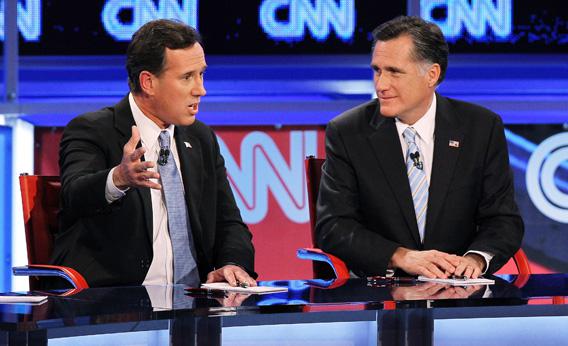Mitt Romney won in six of the 10 states that held primaries on Super Tuesday, with Rick Santorum taking three and Newt Gingrich one. That wasn’t enough to render his candidacy inevitable in the eyes of some pundits, who continue to discuss the possibility of a contested convention. What happens at a contested convention?
Voting, voting, and more voting. Most of the state laws and party rules that dictate how a delegate must vote at the national convention apply to the first ballot only. That’s all you need, so long as one candidate manages to garner at least 50 percent of the vote. However, if no one wins a majority, the convention chair will call for a second ballot in which most delegates are free to vote for whomever they like. (A few states require their delegates to keep voting for the winner of that state’s primary through three or four ballots.) If the second ballot still doesn’t produce a winner, they’ll keep voting until someone has a majority. Since there hasn’t been a multi-ballot convention since 1952, there’s no recent precedent to govern the procedure. The votes could be held in rapid succession, or RNC leaders might call for a recess to allow for campaigning, horse-trading, and arm-twisting. It’s even possible that a currently undeclared candidate could emerge as the winner in a multi-ballot convention.
In spite of the talk, a contested convention is pretty unlikely in this year’s election. Most observers think Romney is going to secure an outright majority. Even if he were to fall a little short, RNC leaders could ask the 117 superdelegates who aren’t bound by state law to vote for the former Massachusetts governor, thus putting him over the top on the first ballot. Some of the superdelegates have already pledged their support to other candidates, but those promises aren’t legally binding, and the RNC would lean heavily on them to prevent an embarrassing, drawn-out dispute. (Multi-ballot conventions don’t always produce bad nominees. Abraham Lincoln needed three ballots to win the nomination in 1860.)
If it became clear that no one could take a majority, even with the help of the superdelegates, the campaigns would likely send their minions out to lobby state delegates in the weeks leading up to the big event. The biggest targets would be states in which the winner of the primary had since dropped out of the race. If the race comes down to Santorum and Romney, for example, delegates from South Carolina and Georgia, which went for Gingrich, would suddenly become very popular. The party leaders would probably ask all of the delegates to declare their intentions before the convention, so that the outcome of the second ballot would be known in advance. The delegates, however, would be under no legal obligation to comply.
This is probably too much for a modern political junkie to hope for, but the 1924 Democratic convention stands out as the most chaotic and prolonged affair in our national political history. The delegates went through 103 ballots before settling on John W. Davis as the party’s nominee. Davis had received just 2.8 percent of the vote on the first ballot. (The convention also represented the high water mark of the Ku Klux Klan’s national political influence.) The more likely scenario is something akin to the 1976 Republican convention, in which neither Gerald Ford nor Ronald Reagan came in with enough pledged delegates to win. Ford’s victory remained in doubt right up until the first ballot, as both sides tried to win over uncommitted delegates, and even considered asking pledged delegates to ignore their voting obligations.
Got a question about today’s news? Ask the Explainer.
Explainer thanks Morton Blackwell of the Leadership Institute, Gregory Magarian of Washington University School of Law, Josh Putnam of Davidson College and the Frontloading HQ blog, Leo Ribuffo of George Washington University, and Joseph Uscinski of the University of Miami.
